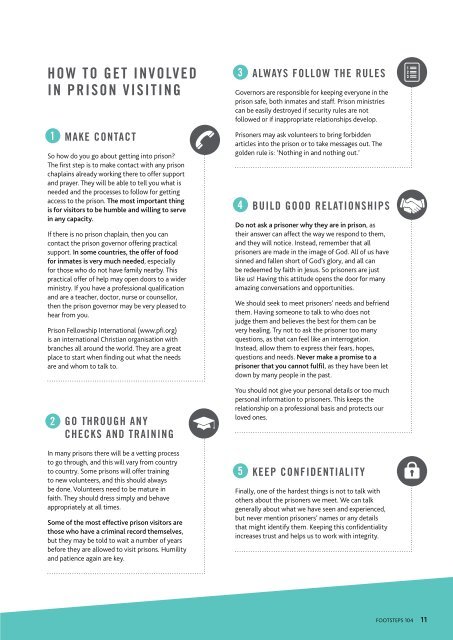Footsteps 104: Prisons
Footsteps 104 features practical tips for getting involved in prison ministry and caring for ex-offenders.
Footsteps 104 features practical tips for getting involved in prison ministry and caring for ex-offenders.
Create successful ePaper yourself
Turn your PDF publications into a flip-book with our unique Google optimized e-Paper software.
HOW TO GET INVOLVED<br />
IN PRISON VISITING<br />
1<br />
MAKE CONTACT<br />
So how do you go about getting into prison?<br />
The first step is to make contact with any prison<br />
chaplains already working there to offer support<br />
and prayer. They will be able to tell you what is<br />
needed and the processes to follow for getting<br />
access to the prison. The most important thing<br />
is for visitors to be humble and willing to serve<br />
in any capacity.<br />
If there is no prison chaplain, then you can<br />
contact the prison governor offering practical<br />
support. In some countries, the offer of food<br />
for inmates is very much needed, especially<br />
for those who do not have family nearby. This<br />
practical offer of help may open doors to a wider<br />
ministry. If you have a professional qualification<br />
and are a teacher, doctor, nurse or counsellor,<br />
then the prison governor may be very pleased to<br />
hear from you.<br />
Prison Fellowship International (www.pfi.org)<br />
is an international Christian organisation with<br />
branches all around the world. They are a great<br />
place to start when finding out what the needs<br />
are and whom to talk to.<br />
3<br />
ALWAYS FOLLOW THE RULES<br />
Governors are responsible for keeping everyone in the<br />
prison safe, both inmates and staff. Prison ministries<br />
can be easily destroyed if security rules are not<br />
followed or if inappropriate relationships develop.<br />
Prisoners may ask volunteers to bring forbidden<br />
articles into the prison or to take messages out. The<br />
golden rule is: ‘Nothing in and nothing out.’<br />
4<br />
BUILD GOOD RELATIONSHIPS<br />
Do not ask a prisoner why they are in prison, as<br />
their answer can affect the way we respond to them,<br />
and they will notice. Instead, remember that all<br />
prisoners are made in the image of God. All of us have<br />
sinned and fallen short of God’s glory, and all can<br />
be redeemed by faith in Jesus. So prisoners are just<br />
like us! Having this attitude opens the door for many<br />
amazing conversations and opportunities.<br />
We should seek to meet prisoners’ needs and befriend<br />
them. Having someone to talk to who does not<br />
judge them and believes the best for them can be<br />
very healing. Try not to ask the prisoner too many<br />
questions, as that can feel like an interrogation.<br />
Instead, allow them to express their fears, hopes,<br />
questions and needs. Never make a promise to a<br />
prisoner that you cannot fulfil, as they have been let<br />
down by many people in the past.<br />
2<br />
GO THROUGH ANY<br />
CHECKS AND TRAINING<br />
You should not give your personal details or too much<br />
personal information to prisoners. This keeps the<br />
relationship on a professional basis and protects our<br />
loved ones.<br />
In many prisons there will be a vetting process<br />
to go through, and this will vary from country<br />
to country. Some prisons will offer training<br />
to new volunteers, and this should always<br />
be done. Volunteers need to be mature in<br />
faith. They should dress simply and behave<br />
appropriately at all times.<br />
Some of the most effective prison visitors are<br />
those who have a criminal record themselves,<br />
but they may be told to wait a number of years<br />
before they are allowed to visit prisons. Humility<br />
and patience again are key.<br />
5<br />
KEEP CONFIDENTIALITY<br />
Finally, one of the hardest things is not to talk with<br />
others about the prisoners we meet. We can talk<br />
generally about what we have seen and experienced,<br />
but never mention prisoners’ names or any details<br />
that might identify them. Keeping this confidentiality<br />
increases trust and helps us to work with integrity.<br />
FOOTSTEPS <strong>104</strong><br />
11
















